
CONTACTAbout UsCAREER OPPORTUNITIESADVERTISE WITH USPRIVACY POLICYPRIVACY PREFERENCESTERMS OF USELEGAL NOTICE
© 2025 Equal Entertainment LLC.
All Rights reserved
All Rights reserved
By continuing to use our site, you agree to our Privacy Policy and Terms of Use.
We need your help
Your support makes The Advocate's original LGBTQ+ reporting possible. Become a member today to help us continue this work.
Your support makes The Advocate's original LGBTQ+ reporting possible. Become a member today to help us continue this work.
It may come as a surprise to some people who are not asexual that many asexuals are in relationships. Some asexual people are even in sexual relationships. As we reported in the previous installment, asexuality does not equal celibacy, so dating is an option for asexuals.
In fact, many do form various relationships and are committed to their partner(s). Yet dating can come with some difficulties, as asexuality isn't typically understood. Some asexual people are sex- and genital-repulsed (terminology among asexuals meaning they do not have sex) and do not want to be sexually intimate with anyone.
That doesn't mean asexuals don't have attractions. Their attractions are based on the person and not on sexual attraction. That is why asexuals typically identify their romantic attractions with their asexuality. Asexuals can be biromantic, heteroromantic, homoromantic, or a variety of labels that identify where their attractions fall on the spectrum.
Asexuals place a high premium in the romantic aspect of relationships. That emphasis goes against a narrative that tends to say individuals in relationships are -- or are going to be -- sexually intimate. Yet that emphasis on romance portion of the relationship highlights asexuals ability to create deep, intimate bonds without necessarily being sexually intimate.
In this third installment of #21AceStories, asexuals discuss if they date, how they date, and why they date.
Alyssa, asexual, 22, Rhode Island: There's a tendency to assume that at a certain point in a relationship, people are going to want sex. I don't work that way. I will continue to not want sex. This confuses people.
Stacy, panromantic ace, 29, Texas: I was already married by the time I came out as asexual. My husband, shortly after I came out as asexual, came out as demisexual. In my scenario, I think the biggest difficulty for me was feeling like I could no longer meet my partner's needs. I am not sex-averse or -repulsed, but I do not want to engage in sexual acts often. My fears are completely my own. My partner does not pressure me or make offhand comments about how he's not "getting any," but with the amount of sex and sexual images that are shoved into my face every day, it's hard for me to not feel like I'm serving him some sort of injustice. I think that would be the hardest thing for me. The prevalence of sex in society. The pressure to conform and the push that everyone feels sexual desire and the media uses it to sell everything from clothes to cars.
Lucian, queer gray ace, 24, New Jersey: I don't date. I wasn't asexual when I was dating around. It's a recent change for me. I have two wonderful partners who may not always understand it, but they try and they respect it. It makes it hard because I was sexual when the relationships started but not anymore, so it is definitely an adjustment for all of us, not just them.
Jack, asexual, 20, New York: It's sort of a universal difficulty, having to explain asexuality, what it is, and clear up some of the misconceptions and misinformation out there. That applies to dating, but it also applies to talking about it in general, since it's so misunderstood. I've never had a conversation about asexuality that's taken less than 10 minutes. It's not like saying "I'm gay," where everyone knows what you're talking about.
Marcia, queer asexual, 29, Missouri: I spent a lot of time dating while not having a clear idea of what I wanted, and so I got myself into many situations where I would have sex and not really know why I wasn't into it. Because I was raised religiously, I believed it was fairly standard not to experience sexual desire for other people until you were married, aand then a switch flipped or something, so when I realized/came out as bi, then lesbian, then queer, marriage wasn't necessarily something I had to look forward to. Sex was on the table, and nine times out of 10 it was a mess of "do not want but am expected to do and want." Probably the biggest difficulty I had was finding the self-confidence and boundaries to be able to say, look, I know you want this, but I don't. It isn't a response to you, it is how I am wired. It's rare to find someone who believes that.
Samantha, asexual, 28, Michigan: I dated once, in high school, for three months. That was 12 years ago. I feel old. Self-deprecation aside, I think my asexuality is a notable factor in my dating inexperience. I guess I'm nervous about how soon to tell someone, and if I get married, we'd have to compromise on it, unless I found someone who's also asexual.
Jason, asexual, 41, Pennsylvania: I am fortunate to be married to the most wonderful person for the last 16 years. I quite easily remember when I was single, though, and the biggest difficulty in dating was not being able to respond physically in the way my date would desire. I remember one woman I dated specifically telling me that she liked to be touched more. It just does not compute with me to think in sexual terms. To engage in sex, it takes a great amount of effort on my part. I am not sure that is true of all asexuals, but certainly it is for me. To even feel comfortable touching somebody takes time for me. I need to know somebody first and feel connected to them emotionally. Casual sex while dating just was not a healthy option for me.
Celestine, asexual panromantic, 34, Louisiana: Finding other asexual people or people who know about and understand what asexuality is and means. I've often been told there's medication to fix me or that I shouldn't discount sex until I've basically "done it right."
Kate, demi-panromantic asexual, 27, South Carolina: I'm a genital/sex-repulsed asexual, so my difficulties in relationships come from the understanding that a lot of people want/need sex in a relationship and that I don't want that -- there are not many people I know who would be willing to be in a sexless relationship, no matter how intimate. I'm incompatible with the vast majority of potential partners. It's a lonely feeling.
Lydia, queer panromantic asexual, 21, Washington, D.C.: Not knowing whether a relationship will last if the other person turns out to be sexual and depends on sexual intimacy to express and experience romantic intimacy, while I can't imagine wanting any part of that.
Ashley, asexual, 19, Texas: That's a tough question, since I've never dated. To me the most daunting prospect would be finding someone, asexual or allosexual, who accepts my sexuality and comfort levels with sex. I would immediately inform them of my sexuality and boundaries. Sex isn't important in an intimate relationship for me; it isn't a necessary part of building a meaningful connection. But what if I date someone feels otherwise? What if the other person needs sex in a relationship? How do we compromise? I'm not sex-repulsed, and I'd be willing to have sex, not just because my partner would want to, so I can see myself being in a relationship with an allosexual if they understood and respected my sexuality. But it would be much more complicated for a sex-repulsed asexual to be in a relationship with an allosexual.
Elizabeth, asexual heteroromantic, 19, South Carolina: The asexual community makes up 1 percent of the world's population, so the likelihood that two asexuals will randomly meet and fall in love is next to none. A relationship of two different sexualities is almost our only expectation. Though I've been in love with two different guys, I have never dated anyone because I'm a bit pessimistic that relationships with allosexuals (those who experience sexual attraction) will work out in the long run. I feel that either they would have to have no sex drive at all or we'd have to compromise for the relationship to last. Some asexuals are OK with compromise because, although sex may disinterest them, they want to please their partner. But for sex-repulsed and genital-repulsed aces like me, sexual relationships are pretty much out of the question. Unless we want to lead on allosexuals, dating them is not a luxury that we have. Compromise is the biggest difficulty with dating, because both parties will have to be willing to give up something important to them. In my case, it would be part of my identity -- which is too high a cost.
Brittney, asexual biromantic, 21, Washington: Sex. Ninety-nine percent of the world's population apparently wants to have sex or is having sex, and when sex is considered a meaningful part of a romantic relationship, asexuals definitely drew the short straw. Some asexuals make it work: They either find a partner who is asexual, or they're sex-positive and are able to have some form of a sexual relationship. I feel sex-repulsed asexuals -- like myself -- have a harder time dating. Every romantic relationship I've had has ended as soon as my partner realized my asexuality wasn't a phase. Having a string of relationships that didn't work out can become disheartening, but it's even more painful when your partner tries to fix you.
Rae, asexual, 26, Maryland: Juggling expectations and compromise were the hard things. I once dated a Catholic guy who eventually told me my asexuality was sinful because it wouldn't produce children in marriage. At the time he seemed "safe" because he was noisy about being anti-premarital sex. With later partners, I had to learn that just because you feel neutral about something doesn't mean it isn't worthwhile to make your partner happy. That can apply to seeing a band you're not into in concert just as well as it can apply in the bedroom.
AJ, asexual heteroromantic, 30, Ohio: I'm not sex-repulsed and I think I have a relatively high sex drive, but being in a relationship with me involves accepting that I will never find you sexually desirable. There's really no pleasant way to say "I'm never going to want to have sex with you," even if you follow it with "but let's see if we can find some middle ground."
As tough as that conversation can be, the biggest difficulty for me has been making sure that my boundaries are respected afterward. Some men have entered into a relationship with me only to realize later that we aren't compatible, and that's OK. But some men seem to think they have a magical penis that can slowly but surely "cure" me of my asexuality. They do not.
Meg, asexual, homograyromantic, 32, Canada: Finding someone you're compatible with sexually. I have personally only had relationships with sexual people, most likely because asexuals make up such a small percentage of the population. As an asexual, I find it hard to find a sexual person that completely understands what asexuality means. I've had partners tell me that asexuality is not real and that I'm not really an asexual simply because I've been in sexual relationships in the past. I've also had partners break up with me due to personally not being able to have a "normal" sex life.
Jessica, Asexual, 27, Florida: I have found that the biggest challenge as an asexual with dating is having to talk to my partner about their expectations with the relationship. As with my previously mentioned conversations, there is confusion and questions, and ultimately I am given the "will wait as long as I have to" answer when the subject of sex is discussed. Of course, I am always admitting up front that I have no desires for such actions and may never, to be fair to them. Sometimes it works out, and other times it doesn't. It's difficult for me to hold a relationship when I know that my partner is hoping for something physical out of it and I do not share those same wants. This can be discouraging, but ultimately I decide for myself what it is I want. Having a partner who is willing to be patient and understanding can be hard to find but not impossible.
Claudie, asexual, 26, Canada: Well, I haven't dated much, I have to say, and not at all since I realized asexuality was an actual sexual orientation. The hardest part of my experiences was that I never understood why people put so much emphasis on sex, and how you could want to date someone based on looks alone. My indifference for sex also led to a lot of rougher times, because I didn't feel normal at all.
Chloe, asexual, 17, Ohio: I haven't dated at all since realizing I didn't feel "that way" about anyone. The biggest difficulty dating while being asexual is the same as being anything else: finding the right person for you. Its a little intimidating, though. There are so many different types of being asexual and trying to find someone in who matches you like that and having chemistry is seemingly impossible sometimes.
Jamie, lesbian gray asexual, 20, New York: When you're in a relationship with a sexual person, your partner will naturally want to pleasure you. Asexuality often puts a damper on relationships because our partners will often feel insufficient or that they are not enough, but that isn't the case! I have to keep reminding partners that it is OK for them to have sexual needs as well as it is OK for me to have nonsexual needs. I am comfortable with stimulating my significant other, but other asexual people may not be, and finding that balance in a relationship can be quite debilitating.
Jackson, multigender trans ace, 28, Nevada: Well, I don't date (even though I would like to be in a relationship with somebody/ies someday). This is largely because I have ascertained that it is inordinately difficult for nonasexual people to fathom an asexual existence. Those who study human behavior in some way (myself included) sometimes spend our entire lives researching all the whys, but I've managed to simplify a couple:
1. U.S. mainstream media pushes "sex sells" in almost all areas of entertainment, especially in Vegas.
2. Messages are still pushed about "biological imperatives" regarding procreation.
These two messages alone carry so much weight and power (and not just in the U.S. either) that if a human isn't buying into these messages wholeheartedly, people that do are thrown for a loop and are seemingly rendered incapable of interacting with us. Additionally, I find a lot of people do not question assumptions and messages we've encountered throughout life; rather, many of us just ignorantly and maybe tacitly go about our day until something metaphorically smacks us in the face and we have to confront this adversary in some way.
From Your Site Articles
From our Sponsors
Most Popular
Bizarre Epstein files reference to Trump, Putin, and oral sex with ‘Bubba’ draws scrutiny in Congress
November 14 2025 4:08 PM
True
Jeffrey Epstein’s brother says the ‘Bubba’ mentioned in Trump oral sex email is not Bill Clinton
November 16 2025 9:15 AM
True
Watch Now: Pride Today
Latest Stories
12 lesbian thrillers and mysteries to binge & where to watch them
December 18 2025 4:36 PM
Netflix's 'Boots' season 2 plot revealed by producer amid cancelation
December 18 2025 4:33 PM
Charlie Kirk's accused killer, Tyler Robinson, on LGBTQ+ issues: It's complicated
December 18 2025 4:04 PM
Sacramento man still in coma six weeks after suspected anti-LGBTQ+ hate crime
December 18 2025 1:17 PM
RFK Jr. and Dr. Oz announce sweeping measures to ban gender-affirming care for trans youth
December 18 2025 12:19 PM
True
Texas city will remove rainbow crosswalks under orders from Trump administration
December 18 2025 11:07 AM
Six key takeaways from Trump's speech to the nation, including 'transgender for everybody'
December 17 2025 10:51 PM
Marjorie Taylor Greene’s bill criminalizing gender-affirming care for minors passes with Democrats’ support
December 17 2025 6:47 PM
True
I didn’t just run the world’s major marathons. I changed them
December 17 2025 4:31 PM
Pam Bondi wants FBI to offer bounties for ‘radical gender ideology’ groups, leaked memo shows
December 17 2025 3:17 PM
Rock Hudson had a 'legendarily large penis,' Armistead Maupin says
December 17 2025 3:05 PM
California councilmember blames daughter becoming a lesbian on sexual trauma
December 17 2025 2:26 PM





























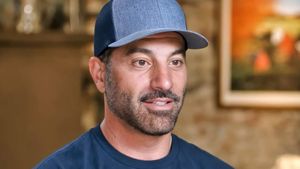









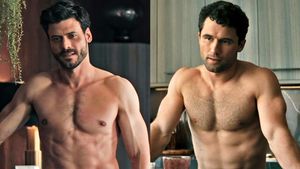














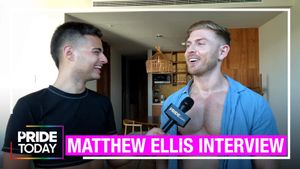

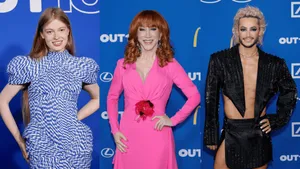


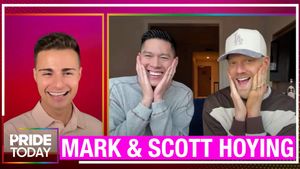

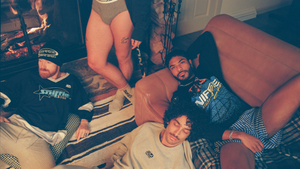
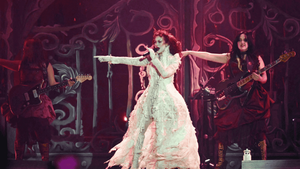


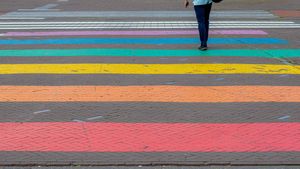

Charlie Kirk DID say stoning gay people was the 'perfect law' — and these other heinous quotes